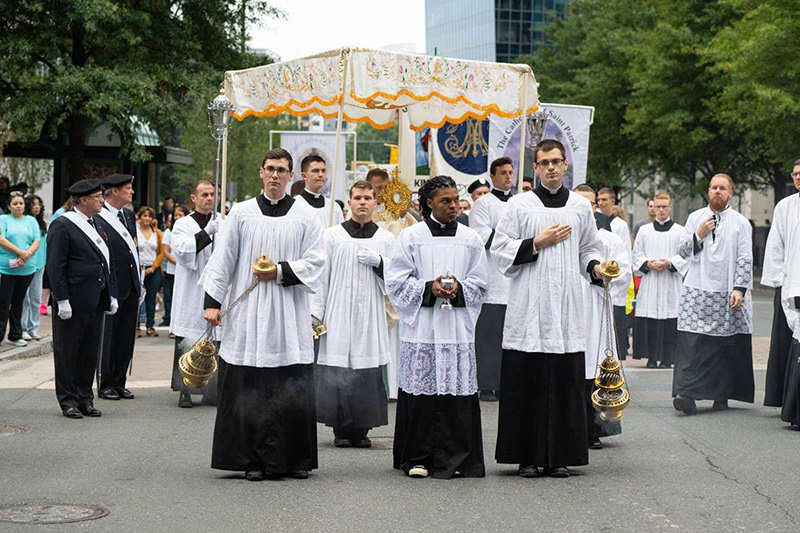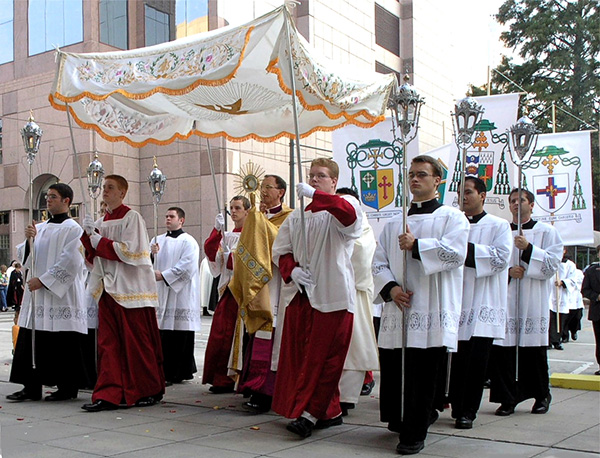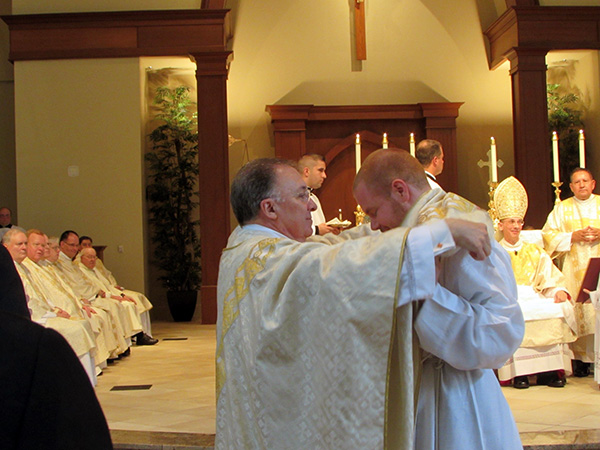Growing up with the Eucharistic Congress
 As assistant emcee, Father Noah Carter (at the far right) watches the sidelines of the 2023 Eucharistic procession in Charlotte.CHARLOTTE — Rising hours before the sun would peek above the mountains, a young Noah Carter left his Mills River home for the big city of Charlotte.
As assistant emcee, Father Noah Carter (at the far right) watches the sidelines of the 2023 Eucharistic procession in Charlotte.CHARLOTTE — Rising hours before the sun would peek above the mountains, a young Noah Carter left his Mills River home for the big city of Charlotte.
Carter hopped on a bus with his older brother Zach and their parents, friend Ben Torres, and others from his home parish of St. Barnabas in Arden. It was Sept. 24, 2005, and the group was headed to the Diocese of Charlotte’s first Eucharistic Congress.
As experienced altar servers, the Carter boys and Torres had been recruited to help carry a special canopy in the Congress’s outdoor Eucharistic procession.
“We had to get up really, really early to get to Charlotte in time for the procession because it’s about a two-hour drive and we had to be there earlier than everybody else,” Carter recalls. “I was in high school, and so I didn’t have a lot of experience with the big city. I just remember feeling lost there.”
That first Eucharistic procession drew 3,500 people. Carter was just 17 and couldn’t imagine he would keep waking up early for this signature event of the Congress over the next 19 years – and that one day he would help lead the procession as a priest.
At that first Eucharistic Congress, Carter and other altar servers reverently made their way alongside Bishop Peter Jugis, who carried the Eucharist in a monstrance that had been blessed by St. John Paul II. Thousands of Catholics winding their way from St. Peter Church to the Charlotte Convention Center was an unusual spectacle at the time – Catholics were a minority in the South and this was probably the first Eucharistic procession through the streets of uptown Charlotte. Charlotteans watched with curiosity from their apartment balconies, and construction workers respectfully tipped their hardhats.
 Then 17-year-old Noah Carter (left, in red cassock) holds one of the front canopy poles as Bishop Peter Jugis carries the Blessed Sacrament in the Diocese of Charlotte’s first Eucharistic procession through Uptown Charlotte in 2005.Less than a year after the first Congress, Carter entered the seminary to become a priest. He returned to North Carolina to help with the second Congress and, like all the diocese’s seminarians, kept coming back throughout his studies. Ten years ago, he was ordained a priest for the diocese, and now he helps organize and lead the Eucharistic procession as an assistant master of ceremonies.
Then 17-year-old Noah Carter (left, in red cassock) holds one of the front canopy poles as Bishop Peter Jugis carries the Blessed Sacrament in the Diocese of Charlotte’s first Eucharistic procession through Uptown Charlotte in 2005.Less than a year after the first Congress, Carter entered the seminary to become a priest. He returned to North Carolina to help with the second Congress and, like all the diocese’s seminarians, kept coming back throughout his studies. Ten years ago, he was ordained a priest for the diocese, and now he helps organize and lead the Eucharistic procession as an assistant master of ceremonies.
“The Congress has always been a source of connection in my own heart to the diocese,” Father Carter says. “I spent some time in seminary discerning religious life … (but) the possibility of going to spend some time discerning always left my heart restless and thinking, ‘Well, this is going to take me away from the diocese.’”
Monsignor Roger Arnsparger, founding chairman of the Eucharistic Congress committee and then-pastor at St. Barnabas, had enlisted his altar servers to help with the procession. Back then, not many people were familiar with what a Eucharistic Congress was, but Monsignor Arnsparger was confident the boys would do well as canopy bearers helping to lead the Charlotte procession.
“I became pastor of St. Barnabas in 1999 when Father Carter was in sixth grade,” Monsignor Arnsparger says. “He and his family were very active. He and his brother served Mass, and they were there to help with the different liturgies. He helped organize our Corpus Christi procession as a young guy and was very active in Eucharistic Adoration.”
Carter helped with the parish’s faith formation program and Catholic culture camp, and he organized retreats for younger children, Monsignor Arnsparger also noted. “He was just very close to the Church.”
Recalls Carter, “In high school, there were two or three of us at every single big parish liturgy, and Father Arnsparger taught us how to emcee, to know the liturgy, how it flows, and to be thinking about what’s coming next, what’s coming two or three steps next, and what you have to set up to be timed well.”
Father Arnsparger gave the high schoolers a copy of the Church’s instructions on how to conduct liturgies, called the General Instruction of the Roman Missal. Carter absorbed the material.
“I very much loved order and reverence in the liturgy and, little by little, learning more,” he recalls.
Carter’s love for the Mass would inspire him to become a priest.
 Monsignor Roger Arnsparger, his former pastor, vests Noah Carter during his ordination as a priest 10 years ago. Monsignor Arnsparger, founding chairman of the committee that organizes the Eucharist Congress, trained Carter and other altar servers from his parish in 2005 to help with the first Congress's Eucharistic procession.With his experience at the Congress and at his parish in leading children to Jesus, it was a natural fit in 2017 when Father Carter was tapped as one of eight assistant emcees for the Eucharistic procession, specifically to shepherd the hundreds of First Communicants and their families who walk near the front of the line – a highlight of the Congress that has created beautiful memories for thousands of children and their families over the years.
Monsignor Roger Arnsparger, his former pastor, vests Noah Carter during his ordination as a priest 10 years ago. Monsignor Arnsparger, founding chairman of the committee that organizes the Eucharist Congress, trained Carter and other altar servers from his parish in 2005 to help with the first Congress's Eucharistic procession.With his experience at the Congress and at his parish in leading children to Jesus, it was a natural fit in 2017 when Father Carter was tapped as one of eight assistant emcees for the Eucharistic procession, specifically to shepherd the hundreds of First Communicants and their families who walk near the front of the line – a highlight of the Congress that has created beautiful memories for thousands of children and their families over the years.
Even with years of experience, Father Carter says it can still be challenging for him and the other emcees to keep everything on track, especially since the annual procession now attracts nearly 10,000 people walking behind the Eucharist: priests, deacons, men and women religious, parishioners, children, Knights of Columbus, service and fraternal groups, altar servers and seminarians – a colorful cross section of the People of God in western North Carolina. But the emcees also notice beautiful moments that others might not catch.
“There are always these moments of sweet grace that shine through, especially during times when issues pop up and we’re thinking, ‘Why didn’t so-and-so go where we planned?’ But then you see this wonderful innocent smile of a First Communicant throwing flowers with the biggest smile on her face, and you think, ‘Oh yeah, that’s why we’re here.’”
“Or you see someone who’s kneeling on the side of the street and in tears, or they’re praying a rosary in a different language. I have no idea what language they’re praying in, but we’re all praying the same prayers to Our Lord.”
Father Carter also feels blessed to experience the diocese’s diversity when he helps ministers and servers carry the monstrance with the Eucharist through various rooms at the Charlotte Convention Center, where specific Congress programs are held for children and young people, special needs families, and others.
One year, he recalls dropping by the special needs program track to get ready for bringing the Blessed Sacrament there for Adoration. The area was bustling with activity.
“I thought of my experience ministering to children with special needs in parishes,” Father Carter says. “Some of them have sensory issues, so I asked if we could bring bells, incense and torches in.”
After some discussion, they decided to omit the bells and incense but include everything else needed for Eucharistic Adoration.
Soon after, Father Carter returned for what he would later describe as one of his all-time favorite memories of the Congress:
“We walked in with the Blessed Sacrament and every single person was on their knees. You could hear a pin drop for the seven minutes that we had the Blessed Sacrament in there,” he recalls. “That’s probably one of the most blessed experiences that I personally have had – being able to see the diversity of the diocese, and how that’s all facilitated by people who have a heart for those different groups.”
— Annie Ferguson
You Belong Here
The 20th annual Diocese of Charlotte Eucharistic Congress will be held Aug. 30-31 at the Charlotte Convention Center.
At GoEucharist.com: Find the full schedule of events, speaker profiles, Eucharistic procession instructions, and more.


